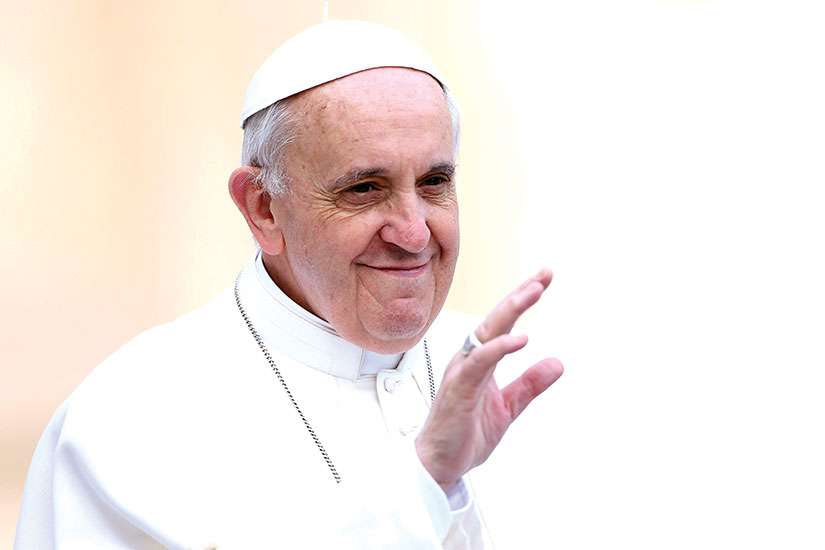Now with no kings or queens left to command, Pope Francis has repurposed the tradition of papal bulls to show us all how to pray, what to love and who we are as Christians.
Misericordiae Vultus is the bull Pope Francis issued to declare a jubilee Year of Mercy and to teach the world the Christian meaning of mercy. The year gets underway when the Pope opens the Holy Door at St. Peter’s Basilica Dec. 8, the feast of the Immaculate Conception of Mary and will end Nov. 20, 2016.
“Our salvation depends on it,” the Pope teaches.
Francis defines mercy as “the ultimate and supreme act by which God comes to meet us.”
For popular retreat master and preacher Fr. Philip Chircop, the Pope is dealing right in his wheelhouse. For Advent, the Jesuit has embarked on a “marathon, so to speak, of parish missions.”
“Needless to say, my focus will be mercy,” said Chircop in an e-mail to The Catholic Register.
Chircop’s Advent mission will contemplate mercy under the title “Practising mercy: Kissed by mercy, embraced by love.”
It’s a theme that sends Chircop directly to the Gospels.
“I love to consider the Gospels (and the whole Bible, in fact) as an organic, pregnant collection of books always in a state of becoming — challenging us and hopefully changing us along the way,” he said.
Lectio Divina — prayerful and concentrated reading of the Bible — and Ignatian prayer of the imagination, in which the reader imagines him or herself as a participant in a biblical story, are two forms of prayer that almost always put flesh on our notions of mercy, said Chircop.For Pope Francis the Year of Mercy is also a call to the confessional. Pope Francis has ordered the opening of holy doors for pilgrims not only in Rome, but in every diocese in the world.
The Archdiocese of Toronto will have nine parish churches where pilgrims may pass through the holy doors to obtain an indulgence, but just walking through the doors won’t be enough. The faithful must also go to confession.
“Confessors are called to be a sign of the primacy of mercy always, everywhere and in every situation, no matter what,” Francis wrote in his bull.
Francis doesn’t stop there. He is also sending out special “Missionaries of Mercy” — priests with special powers as confessors “to pardon even those sins reserved to the Holy See.” The Pope’s purpose in sending out such special confessors is so that they will be “living signs of the Father’s readiness to welcome those in search of His pardon.”
In Toronto, Cardinal Thomas Collins will appoint, with the Holy Father’s approval, a number of priests to be Missionaries of Mercy in time for their special, papal faculties or powers to kick in at the beginning of Lent.
“Jesus is bent on revealing the great gift of mercy that searches out sinners and offers them pardon and salvation,” writes Pope Francis.
Pope Francis is both canny and sincere when he so frequently and insistently links the year of mercy with Mary, said Doris Kieser, a theologian at St. Joseph’s College, University of Alberta. The Pope’s devotion to Mary couldn’t be more genuine, but it is also something he can use to help communicate how immediate and available God’s mercy is to all of us, said Kieser.
“Pope Francis in particular has noted his affinity for Mary, the untier of knots,” she said. “I think there’s something merciful about that. We can look at knots in a million different ways, but they tend to hold us back. They tend to keep us from seeking redemption.
They tend to keep us away from beauty and goodness. That Mary can untie those knots, it’s a very merciful act in a faith perspective.
I think Mary has always been that.” The Year of Mercy is an opportunity to heal some of the divisions in a badly polarized Catholic Church, said Kieser.
“Just calling a Year of Mercy, it’s calling on our humility,” she said. “There’s a certain humility that comes with the capacity to extend mercy to one another. We are in many ways a Church divided — and I don’t just mean ecumenically, I mean even in the Roman Catholic context... Mercy invites us to humility about what it means to live the life of God, the life of Christ.”
When Catholics begin by including Mary in their prayers, everyone has the same starting point whether they have a PhD in theology or just the memories of a Catholic upbringing.
“Mary is that entry point because she is real. She is human,” said Kieser. “She was asked this extraordinary question and was given this extraordinary task. She did it and then watched her son be beaten and killed and all of that.”
Mary asks for the same mercy all of us need.
“No one has penetrated the profound mystery of the incarnation like Mary,” writes Pope Francis. “Her entire life was patterned after the presence of mercy made flesh. The Mother of the Crucified and Risen One has entered the sanctuary of divine mercy because she participated intimately in the mystery of His love.”

